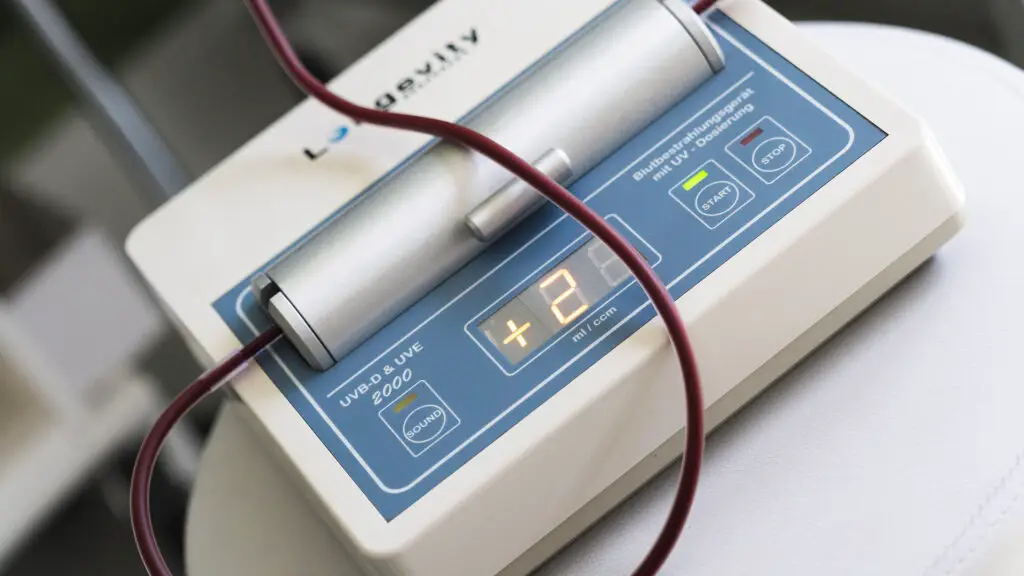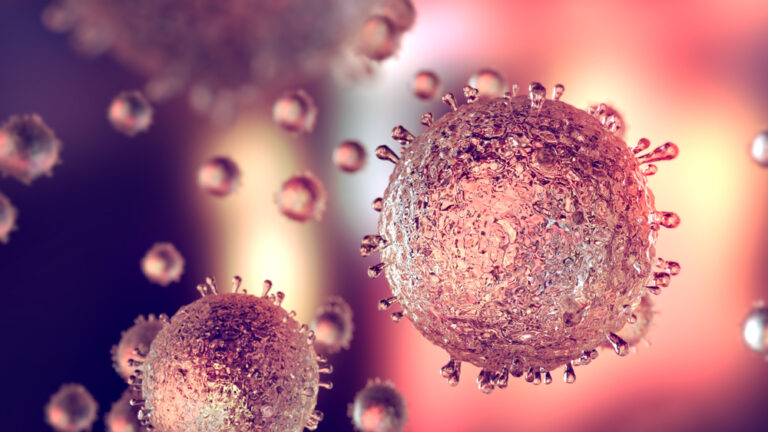What is Ultraviolet Blood Irradiation (UBI)?
UBI involves a process where blood is drawn from a patient and exposed to controlled UV light. The blood passes through a specialized device that uses UV rays to target harmful microorganisms such as bacteria, viruses, and fungi. The UV light damages their DNA, rendering them inactive without harming healthy cells. The treated blood is then returned to the body, which stimulates a powerful immune response and improves circulation.
Here’s a quick rundown of how UBI works:
- Blood is withdrawn from the patient’s arm using a small needle.
- UV rays are applied to the blood, effectively neutralizing harmful pathogens.
- Healthy blood cells remain intact while the pathogens are deactivated and become antigenic, which helps the immune system recognize and fight similar invaders in the future, an “autolog vaccine” in a way.
The treated blood is returned to the body, helping to enhance overall immune function and promote better circulation.
Key Benefits of UBI
1. Boosts Immune Function
UBI is especially effective in stimulating the immune system, helping it recognize and fight off various infections more effectively. It activates and regulates white blood cells, including neutrophils, lymphocytes, and macrophages, which are essential for immune responses. By enhancing these cellular activities, UBI helps the body fight infections, even when the immune system is weakened or compromised.
2. Increases Oxygenation and Circulation
The UV light from UBI causes vasodilation, or the widening of blood vessels, which improves blood flow. This enhanced circulation helps tissues and organs receive more oxygen, improving overall vitality, aiding in tissue repair, and promoting muscle recovery.
3. Activates Vitamin D Production
UBI also plays a role in activating cortisone-like molecules (sterols) in the body, which are converted into vitamin D. Vitamin D is crucial for immune health, bone strength, and inflammation regulation, making UBI a valuable option for individuals with various health conditions, including those undergoing cancer care.
4. Targets Pathogens Without Resistance
One of the most significant advantages of UBI is its ability to neutralize pathogens without the risk of developing resistance. Unlike antibiotics, microorganisms exposed to UV light do not develop resistance, making UBI a valuable option for combating infections caused by multi-antibiotic-resistant strains.
5. Supports Detoxification
UBI enhances the body’s ability to detoxify by helping remove toxins that have built up, which is especially beneficial for those with liver disease or chronic toxicity. By boosting detoxification processes, UBI helps the body rid itself of harmful substances, contributing to better overall health.
The UV light from UBI causes vasodilation, or the widening of blood vessels, which improves blood flow. This enhanced circulation helps tissues and organs receive more oxygen, improving overall vitality, aiding in tissue repair, and promoting muscle recovery.
What Conditions Can UBI Help With?
UBI is versatile and can be beneficial in addressing a wide range of health conditions. Here are some of the key conditions it can assist with:
Infections: UBI has shown effectiveness against a variety of viral, bacterial, and fungal infections. This includes conditions like:
- Hepatitis (A, B, C)
- Tuberculosis
- Staphylococcal and streptococcal infections
- Lyme disease
- HIV/AIDS
- Urinary tract infections (UTIs)
- Mononucleosis
- Norovirus
Infections: UBI has shown effectiveness against a variety of viral, bacterial, and fungal infections. This includes conditions like:
- Hepatitis (A, B, C)
- Tuberculosis
- Staphylococcal and streptococcal infections
- Lyme disease
- HIV/AIDS
- Urinary tract infections (UTIs)
- Mononucleosis
- Norovirus
Autoimmune Diseases: UBI has shown promise in regulating the immune system in conditions like:
- Rheumatoid arthritis
- Multiple sclerosis (MS)
- Lupus
- Hashimoto’s thyroiditis
- Celiac disease
Chronic Pain and Fatigue: For individuals with conditions linked to high levels of inflammation, such as:
- Fibromyalgia
- Chronic fatigue syndrome (ME/CFS)
- Ehlers-Danlos syndrome
- Temporomandibular joint disorders (TMJ)
- Fibromyalgia
Cancer Support: By strengthening the immune system, fighting infections and enhancing oxygen delivery to the affected tissue.,









